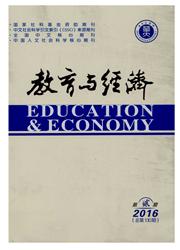

 中文摘要:
中文摘要:
本文将东北城市劳动力按受教育程度划分为三个群体,应用分位数回归方法和反事实分析方法在个体水平上度量了每个群体中的工资性别歧视程度,并通过比较群体间和群体内部的工资歧视程度分析了教育对工资性别歧视的影响。研究表明,在所有受教育群体中,均存在针对女性的工资歧视;随着个体受教育程度的提高,工资性别歧视不断缩小;在所有受教育群体中,随着工资水平的提高,工资性别歧视呈现出下降趋势。因此,政府在设计和实施公平的就业制度和工资制度的同时,通过发展教育提升女性人力资本水平,将有助于缓解工资性别歧视和缩小工资性别差异。
 英文摘要:
英文摘要:
This paper divide the labor force in Northeast cities of China into three groups by education.Based on quantile regression of wage equation and counterfactual analysis,we analyze the gender wage discrimination on individual level in all groups and the influence of education on gender wage discrimination by comparing the wage discrimination between and within groups.The results show that there is significant wage discrimination against women in all groups;wage differential due to gender discrimination is smaller when the group’s educational level is higher;women with higher wage suffer smaller wage discrimination in all groups.Therefore,on the one hand,the government should be dedicated to the design and implementation of fair employment system and wage system;on the other hand,the government should enhance human capital of women,which will help alleviate gender wage differential in urban labor market.
 同期刊论文项目
同期刊论文项目
 同项目期刊论文
同项目期刊论文
 期刊信息
期刊信息
